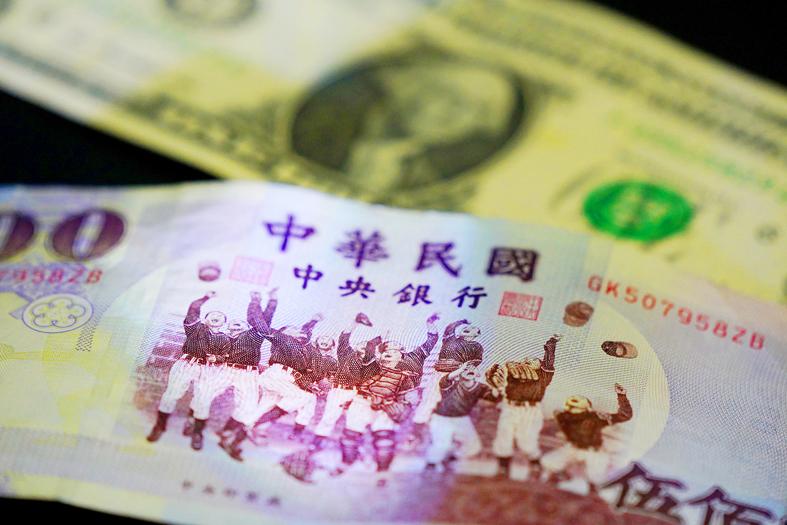Taiwan’s foreign exchange reserves last month grew US$631 million to a record high of US$547.33 billion, as the US dollar strengthened against other major reserve currencies despite a net fund flow on the part of foreign stock players, the central bank said yesterday.
It is the fourth consecutive month that foreign exchange reserves have climbed, making Taiwan the world’s fifth-largest holder of foreign exchange reserves after China, Japan, Switzerland and India, the central bank said.
“The local foreign exchange market saw a relative balance in supply and demand, although foreign portfolio managers wired out a net US$437 million,” Department of Foreign Exchange Director-General Eugene Tsai (蔡炯民) said, adding that they wired US$6 billion in capital gains overseas and increased their positions in local shares by US$6.1 billion.

Photo: CNA
At the same time, the US dollar appreciated by 2 percent, while the euro weakened by 3.22 percent, the Japanese yen declined 0.06 percent and the British pound lost 3.43 percent, Tsai said.
Tsai agreed that US Federal Reserve is likely to end its bond purchase program in the first quarter of next year — three months earlier than scheduled — to rein in inflationary pressures.
The move, if realized, would surely affect global financial markets, including the local bourse and foreign exchange market, Tsai said, adding that Taiwan is more susceptible to global capital movements than to international oil price changes.
Global funds tend to flock to the US when the world’s largest economy puts up a robust showing and the Fed raises interest rates, Tsai said.
Over the weekend, Taiwan managed to stay off the US currency manipulation list because there is no evidence suggesting it has engaged in unfair practices to profit from foreign exchange interventions, he said.
Interventions by the central bank equaled US$43.93 billion between July last year and June this year, and were intended to help maintain the foreign exchange market’s stability which had been affected by the US’ quantitative easing, he added.

The US dollar was trading at NT$29.7 at 10am today on the Taipei Foreign Exchange, as the New Taiwan dollar gained NT$1.364 from the previous close last week. The NT dollar continued to rise today, after surging 3.07 percent on Friday. After opening at NT$30.91, the NT dollar gained more than NT$1 in just 15 minutes, briefly passing the NT$30 mark. Before the US Department of the Treasury's semi-annual currency report came out, expectations that the NT dollar would keep rising were already building. The NT dollar on Friday closed at NT$31.064, up by NT$0.953 — a 3.07 percent single-day gain. Today,

‘SHORT TERM’: The local currency would likely remain strong in the near term, driven by anticipated US trade pressure, capital inflows and expectations of a US Fed rate cut The US dollar is expected to fall below NT$30 in the near term, as traders anticipate increased pressure from Washington for Taiwan to allow the New Taiwan dollar to appreciate, Cathay United Bank (國泰世華銀行) chief economist Lin Chi-chao (林啟超) said. Following a sharp drop in the greenback against the NT dollar on Friday, Lin told the Central News Agency that the local currency is likely to remain strong in the short term, driven in part by market psychology surrounding anticipated US policy pressure. On Friday, the US dollar fell NT$0.953, or 3.07 percent, closing at NT$31.064 — its lowest level since Jan.

The New Taiwan dollar and Taiwanese stocks surged on signs that trade tensions between the world’s top two economies might start easing and as US tech earnings boosted the outlook of the nation’s semiconductor exports. The NT dollar strengthened as much as 3.8 percent versus the US dollar to 30.815, the biggest intraday gain since January 2011, closing at NT$31.064. The benchmark TAIEX jumped 2.73 percent to outperform the region’s equity gauges. Outlook for global trade improved after China said it is assessing possible trade talks with the US, providing a boost for the nation’s currency and shares. As the NT dollar

The Financial Supervisory Commission (FSC) yesterday met with some of the nation’s largest insurance companies as a skyrocketing New Taiwan dollar piles pressure on their hundreds of billions of dollars in US bond investments. The commission has asked some life insurance firms, among the biggest Asian holders of US debt, to discuss how the rapidly strengthening NT dollar has impacted their operations, people familiar with the matter said. The meeting took place as the NT dollar jumped as much as 5 percent yesterday, its biggest intraday gain in more than three decades. The local currency surged as exporters rushed to